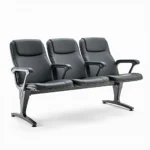Getting through airport security and onto your flight can be a stressful experience, especially if you’re unfamiliar with the process. One of the key elements that can ease your worries is understanding the Airport Entry Pass. This guide will provide you with a comprehensive understanding of airport entry passes, from what they are and why they are necessary to the different types available and how to obtain one.
What is an Airport Entry Pass?
An airport entry pass, also known as an airport security pass or airport badge, is a document that grants authorized individuals access to restricted areas within an airport. It typically includes the individual’s name, photo, and identification number, and is often used to access security checkpoints, baggage handling areas, and other sensitive locations.
Why is an Airport Entry Pass Necessary?
Airport entry passes are crucial for ensuring the safety and security of airports and passengers. They help to:
- Control access to restricted areas: Only authorized personnel are allowed to enter sensitive areas, such as baggage handling facilities and aircraft boarding gates.
- Identify individuals: Airport staff, security personnel, and other authorized personnel can easily be identified through their airport entry passes.
- Track movement within the airport: The passes can be used to track the movement of individuals within the airport, which is essential for security purposes.
- Enhance security measures: By restricting access and identifying individuals, airport entry passes contribute to a more secure environment for passengers and staff alike.
Types of Airport Entry Passes
Airport entry passes come in different types, each with its own specific purpose and level of access:
- Employee Pass: Issued to airport employees, contractors, and other individuals who work regularly at the airport. These passes typically grant access to specific areas related to their job duties.
- Visitor Pass: Issued to visitors who are not airport employees but need access to specific areas for a limited time, such as for meetings or tours.
- Contractor Pass: Granted to individuals who work for contractors providing services to the airport, such as construction, cleaning, or catering.
- Media Pass: Issued to journalists and other media personnel who need access to the airport for reporting purposes.
- Security Pass: This type of pass is granted to security personnel and law enforcement officers who require access to restricted areas for security purposes.
How to Obtain an Airport Entry Pass
The process for obtaining an airport entry pass varies depending on the airport and the type of pass required. Generally, you will need to provide:
- Valid identification: A government-issued ID such as a driver’s license or passport.
- Proof of employment or affiliation: If applying for an employee or contractor pass, you will need to provide proof of employment or affiliation with the airport or a contractor.
- Background check: Most airports conduct background checks on all individuals applying for airport entry passes.
Airport Entry Pass Regulations and Procedures
It is important to be aware of the regulations and procedures related to airport entry passes, as these can vary significantly between airports. Some common regulations include:
- Pass presentation: You will be required to present your pass at security checkpoints and other restricted areas.
- Pass validity: Passes typically have an expiration date, and you may need to renew them before they expire.
- Pass usage: Each pass is usually designated for a specific individual and cannot be transferred or shared with others.
- Lost or stolen passes: If you lose or your pass is stolen, report it immediately to the airport authorities.
Importance of Airport Entry Passes for Travelers
While most travelers won’t need an airport entry pass to access the general passenger areas, it’s crucial to understand their role in maintaining airport security. As a passenger, you should be aware of the following:
- Security checkpoints: Airport entry passes are used by security personnel to ensure that only authorized individuals are allowed to access restricted areas.
- Passenger information: The information on your boarding pass and ID is used to verify your identity and ensure you are the authorized passenger on the flight.
- Airport procedures: Familiarize yourself with the airport’s security procedures and follow instructions from airport staff.
Frequently Asked Questions (FAQ)
Q: Can I bring my own food and drinks into the airport?
A: Some airports allow outside food and drinks, but this can vary. Check with the airport website or contact them directly for specific guidelines.
Q: What can I bring in my carry-on bag?
A: The Transportation Security Administration (TSA) has specific guidelines on what items are allowed in carry-on bags. Check the TSA website for the most up-to-date information.
Q: Do I need to remove my shoes at security?
A: This depends on the airport and the security procedures in place. It’s always best to follow the instructions of the security personnel.
Q: What happens if I forget my airport entry pass?
A: If you forget your airport entry pass, you may need to provide additional identification or contact the airport authorities for assistance.
Q: What should I do if I see something suspicious at the airport?
A: Report any suspicious activity or items to the airport security personnel immediately. Your vigilance can help to keep the airport safe.
Conclusion
Airport entry passes are essential for maintaining security and controlling access to restricted areas at airports. Understanding the different types of passes, how to obtain them, and the relevant regulations will help travelers and airport personnel alike navigate the airport environment safely and efficiently. For more information and assistance, please contact our customer support team at +13089626264, [email protected] or visit our office at 404 Bothwell St, Oxford, NE 68967, USA. We are available 24/7 to assist you with any questions or concerns.
